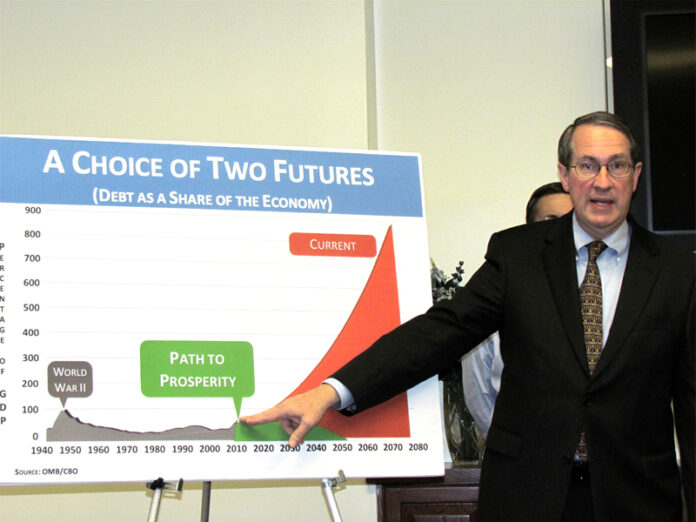
Using charts to illustrate his point that the federal government’s $14 trillion debt is unsustainable, Republican 6th District Congressman Bob Goodlatte detailed his Balanced Budget Amendment to the U.S. Constitution last Friday.
He was joined in support by Congressman Morgan Griffith (R-9), Va. Senator Ralph Smith, Delegate Charles Poindexter and Republican candidate for the 17th House of Delegates Chris Head at the Roanoke Regional Chamber of Commerce.
In 1995 the U.S. House of Representatives passed a balanced budget amendment, but it failed in the U.S. Senate by one vote. Thirty-eight states would have to ratify any proposed amendment before it could be added to the U.S. Constitution.
Goodlatte said that “49 out of 50 states have a balanced budget requirement themselves.” It would ensure that no matter who controlled the Congress, they would have to abide by it.
“It would require Congress to set priorities,” he said. The explanation he gave correlated with Roanoke City Manager Chris Morrill’s “Budgeting for Outcomes” instituted for fiscal year 2011. Priorities are set by a panel, a bucket of money is allocated and budgets are determined accordingly.
City councils and state legislatures first get a whack at the priorities and make the final call on allocations. States often end up using creative accounting to balance their budgets. They can sell state assets, postpone payments to vendors, and reduce payments to pension funds and borrow from one state fund to finance expenditures from another.
Virginia Representative Bobby Scott, Ranking Member of the Crime Subcommittee on the House Judiciary Committee, said the amendment “puts Social Security and Medicare at serious risk.” Scott, elected in 1992, represents the cities of Portsmouth, Norfolk, Richmond and counties of Henrico and Prince George.
The amendment states that a “super majority” (2/3 in both Houses) vote is required to increase revenues and raise the debt limit. It further restricts debt to no more than 18% of Gross Domestic Product (GDP) in any given year. Only a simple majority vote (over ½ in both Houses) would be required to cut spending. This would leave open the door to cut Social Security, Medicare, and create special interest tax loopholes, according to Scott.
“Not since Medicare was adopted has the GDP been at or below 18%,” said Scott. Debt stands at 40% of GDP today. “You’re going to have to cut [Social Security] because you’re not going to be able to raise taxes,” he said.
Scott says the question that should be asked is: “will it help or hurt the campaign to get to a balanced budget.” The provisions that make up the bill are overlooked.
“Most people are mesmerized by the title,” said Scott. The first provision requires a 2/3 vote on a budget that is not even in balance, he pointed out. To have a serious deficit reduction plan it should require a 3/5 vote, not a simple majority to increase revenue. “Any serious deficit reduction plan has to have some path to get to balance … the idea that you can get to balance in one year is politically absurd,” he said.
Forty-nine out of 50 states are said to have a balanced budget amendment in their Constitution. At Tuesday’s hearing, Scott said he asked Governor Dick Thornburgh of Pennsylvania what in the bill would balance the budget. Scott said, “all I got [from him] was mumbo and a couple of things that weren’t even in the bill.”
Borrowing for capital expenditures does not count toward the budget. Goodlatte responded to a question about Virginia’s use of Grant Anticipated Revenue Vehicle (GARVEE) bonds for highway construction by pointing out that at the conclusion of a transportation project, the federal government will repay the Commonwealth of Virginia. There is no risk to the state; however, repayment to bond investors lies solely with the state, not the federal government.
Rating agencies have pointed out the weakness in depending on this continued federal funding program. The chance that federal funds would not be available is remote. The question remains as to how a balanced budget amendment and spending cuts will affect the program.
Without a balanced budget amendment Goodlatte believes Congress and the President have no incentive to reduce spending. “China,” he said, “owns a trillion dollars of our debt.”
Along with 9th district Congressman Morgan Griffith, Goodlatte believes the debt is “having a very serious impact on the economy of our country and on job creation.” Goodlatte’s chart predicted a scenario that by 2075 the United States debt would be at 900% of the Gross Domestic Product (GDP). “Our economy will collapse long before we get to that,” he said.
“We can’t wait until a balanced budget can be ratified [by the states] … it’s slow going,” he said.
Both House Joint Resolutions that Goodlatte has submitted have deadlines of the beginning of the fiscal year following December 31, 2016.

